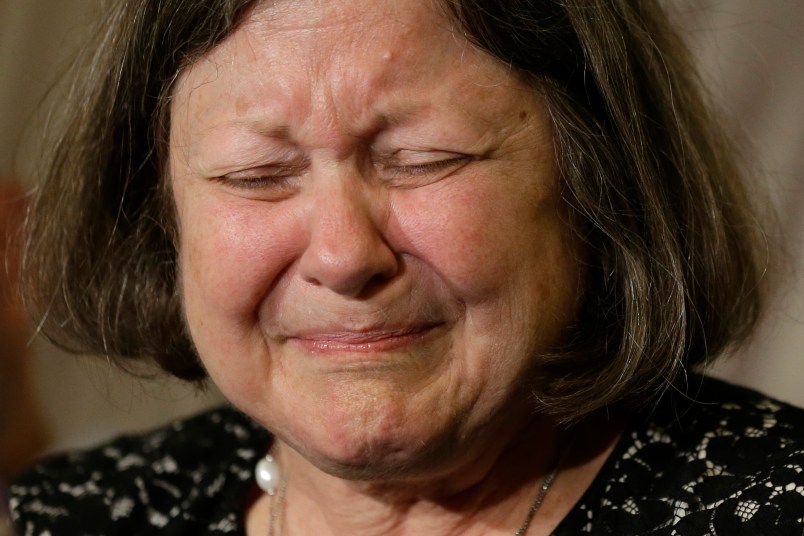While a Super Bowl winner will soon be crowned, a shadow of a controversial settlement will hang over this match-up. Last week federal judge Anita Brody denied the preliminary approval of a $765 million settlement between the National Football League (NFL) and nearly 4,500 former players over concussion claims. Brody’s denial while certainly about sufficiency of evidence, her primary concern was to ensure that players were compensated now and in the long term.
This is a story about science, sports, corporations and power. This is a lawsuit about money, accountability and risk — ultimately matters that will impact the future of the NFL. Missing is the recognition that crucial to unearthing the nature and extent of the concussion cover-up in football was women: a female doctor armed with science, wives of the players and a female judge on the bench.
Dr. Anna McKee, a neuropathologist at Boston University’s Center for the Study of Traumatic Encephalopathy was chiefly responsible for identifying and systematically researching Chronic traumatic encephalopathy (CTE), a degenerative brain disease similar to Alzheimer’s, as a result of trauma-induced damage from football. Her discovery was a game-changer involving research on the brain, but she faced difficulty as a woman in a traditionally male-dominated field. And indeed, she has spoken about the challenges to be taken seriously by colleagues and the NFL’s attempts to undermine her medical research.
NFL wives became frontline diagnosticians and legal advocates for their husbands. They were the primary activists who aligned with doctors to identify their husbands’ symptoms, to provide a long-term narrative to explain the transformation in former players and convincingly argue that symptoms were related to their husband’s injuries incurred from football. For their husbands, whose executive function and voices were rendered silent, the wives had to speak on behalf of the retired players as they demanded entry to players’ union meetings and held press conferences. They made these efforts in spite of the NFL’s attempts to disenfranchise them. In essence, the wives were left to pick up the pieces.
Judge Brody’s rejection of the proposed settlement relied on the force of law to compel attorneys to provide more economic evidence that the financial award was adequate. “I am primarily concerned that not all retired NFL football players who ultimately receive a qualifying diagnosis or their [loved ones] … will be paid,” she wrote in her opinion.
Her concern is not simply about the 4,500 plaintiffs who signed onto the lawsuit, but instead the 20,000 former players who are eligible under the terms of the settlement but have yet to come forward. Rather than “rubber-stamping” the terms crafted by attorneys, Brody used legal rules to question this class action settlement and uphold the central tenets of law such as fairness and equity.”
Certainly this story of the NFL cover-up involved men who also played a role in discovering the nature and extent of concussion-related illnesses. Dr. Bennet Omalu conducted the autopsy of Pittsburgh Steelers frontline center, “Iron” Mike Webster, one of the first reported cases of Chronic traumatic encephalopathy (CTE). Omalu’s work led to the discovery of the disease, which he ultimately named. Mark Fainaru-Wada and Steve Fainaru, investigative journalists, pressured the league’s denial of science and slowly, exposed the NFL’s attempts to cover-up the epidemic of traumatic brain injuries in the league.
However, women played a broader role in what sociological scholars would call the “naming, blaming, and claiming” of disputes. This process is sequential, going from naming, in which a particular experience is understood as injurious, to blaming, in which a person reacts to the experience, to claiming, in which person seeks relief for their injury. In the case of the NFL, all these roles have been occupied by women and beyond legal change, we are seeing institutional change in a sport that dramatizes masculinity and power.
We have yet to mention one last set of female “players” whose future role and reaction to the NFL scandal could determine the life (or death) of football in America: Moms. One of the NFL doctors was quoted as saying, “If 10 percent of mothers in this country would begin to perceive football as a dangerous sport, that is the end of football.” It is not surprise that clinics once aimed at basic football literacy for women have transformed into “safety clinics for Moms” and public relations damage control. The Chicago Bears, Pittsburgh Steelers, Kansas City Chiefs, and on college level, perennial Bowl contender, the Ohio State, all have such publicized events in their cities.
The NFL is known for its hard hits and large lineman, but what they should worry about are not those things. Perhaps women playing defense and saying their boys’ brains are worth more than a settlement is what the NFL should fear the most.
Nicole Martorano Van Cleve, PhD Assistant Professor, Department of Criminal Justice, Temple University with courtesy appointments in the Department of Sociology and The Beasley School of Law. Jill D. Weinberg is an attorney, an instructor at Northwestern University in the Master’s of Sports Administration Graduate Program and PhD candidate in Sociology, and a Research Associate at the American Bar Foundation. She is an alum of The OpEd Project.






